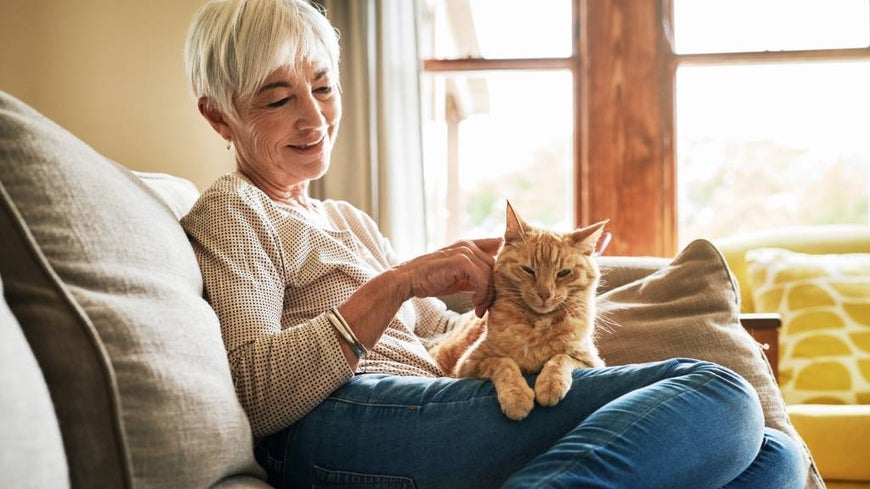The Australian Seniors Series: For the Love of Pets Report

Most pet owners are quick to share the immense joys that come with having a pet in their homes, be it a Golden Retriever or a goldfish. The companionship we share with our non-human friends touches our emotions, improves our health, and enriches our life journey.
The For the Love of Pets Report 2024 forms part of the Australian Seniors research series, which explores the subject matters most important to our community. Surveying 720 Australians over 50, this comprehensive study delves into the attitudes, benefits, and potential challenges of being a pet parent in later life.
The research found that almost all of us (96%) agree that pets bring a meaningful connection to our lives, primarily through unconditional love, affection, and companionship.

So, what are we willing to spend on them?
According to the findings, most of us agree that you can’t put a price on love from our furry friends. In fact, some of us admit to spending more money on our pets than we do on our kids and grandkids (28%) and even our partners (24%). But when reflecting on how much we spend on pet essentials, the answer becomes clear. More than a third of us (35%) spend $100–$199 each month on food, vet bills, grooming, health products, and toys for our pets, and nearly a quarter of us (24%) comfortably exceed this, spending $200–$299 or more.
While dogs are by far the most popular furry friends (66%), we also share our homes with cats (45%), fish (9%) and birds (13%). We even have multiple pets, with almost a fifth of us (18%) having both canine and feline family members.
The bond between pet and pet parent can have a profound impact on our general emotional well-being. In fact, nearly all of us (95%) agree that pets positively influence our mental health, helping to alleviate loneliness and offering new avenues for meeting new people and fostering social connections.
For instance, the routine of caring for our pets is just one way we can feel a sense of joy and purpose. In fact, the report findings suggest dogs give us more opportunities for exercise and socialising, and a greater sense of personal safety and protection than cats. Furthermore, dog owners prove to be over twice as likely to meet people through their pets than cat owners (54% vs. 25%).

‘Furever’ home
Pet rescues are by far the most popular method of obtaining pets, with just over half of us (52%) obtaining our pets this way. Incidentally, women (57%) are more likely than men (46%) to adopt a pet from a shelter.
The second most popular method is breeders, with just under a quarter of us (24%) searching for our next pet this way. Family and friends (13%) and pet shops (6%) are the next avenues we take when looking to get a pet.
Almost two-thirds of us (60%) meet our furry family members when they are less than a year old, while 3 in 10 of us (30%) obtain them between the ages of 1 and 5.

Relationship with pets
There is no doubt our pets are good for us, but what do we love most about them? More than three quarters of us (76%) agree that personality is the quality we cherish most about our pets, followed by their loyalty (71%) and comforting presence (68%). Naturally, around 2 in 3 of us (66%) also treasure the unconditional love they provide.
Given our love for animals (65%) is the key driving force behind our decision to embrace pet parenthood, it’s no surprise that many of us (41%) hang photos of our pets in our home, workplace or feature them as our device home screens. It’s also clear we share an affinity for other pet lovers, with close to 2 in 5 of us (38%) striking up conversations or meeting new people while walking our pets.
Companion currency
Unfortunately, pet parenthood is not always a walk in the park, with nearly 2 in 5 of us (37%) experiencing difficulties affording pet care.
While almost 2 in 3 of us (63%) would choose to fund a pet medical emergency exceeding $2,000 with our savings, over 1 in 3 of us (37%) would use credit cards.
But how much money is too much?
While most of us would give anything to protect our furry friends, some vet procedures can be a stretch financially. In fact, more than half of us (58%) say we could only afford to spend $2,000 or less on urgent medical attention to ensure our pet’s survival. Only 1 in 10 of us (10%) would be willing to spend $5,000–$10,000, and the same proportion (10%) would be willing to spend more than $10,000.
When it comes to spoiling our pets, special food treats are the most commonly purchased item (77%), followed by pet toys or training aids (59%) and grooming supplies (45%). Overall, dog owners seem to spoil their furry friends more than cat owners.
Over three quarters of us (76%) would be willing to make spending or saving sacrifices to fund our pet’s health.
When it comes to spending, discretionary expenses are the first to go. Cutting back on eating out (52%), going out (49%), buying clothes and shoes (46%), and holidays (42%) emerged as the top spending sacrifices.
Just over a quarter of us (28%) are willing to reduce our savings commitments, which could be directly linked to the rising cost of living.
Upkeep of pets
While the benefits of pet ownership are extensive, looking after a pet can be stressful from time to time, especially as we age.
Over 7 in 10 of us (72%) seek support from others to help care for our pet, while almost 2 in 5 (39%) look to our partners for help with pet care.
Naturally, almost 2 in 3 of us (62%) are concerned about the fate of our pets should something happen to us or if we’re no longer able to care for them. However, some of us are more prepared than others, with just under a third of us (32%) having a contingency plan in place should our circumstances change, while slightly less (31%) haven’t made any plans whatsoever.
Furthermore, the research found that approximately 1 in 10 of us (11%) have included our pets in our will, while almost a third (32%) are planning to do so or have discussed our wishes with friends and family.
For the love of pets — and living with them
Our attachment to pets is deep, and there are special considerations to make when living with and providing for them.
For those of us who rent, around 7 in 10 (69%) feel it’s somewhat more difficult to find a suitable place to live in, compared to only 1 in 3 (34%) homeowners.
The research also found that most of us support pet inclusions for residential aged care, retirement villages and/or rental accommodation for the elderly.
In essence, the profound bond between us and our beloved pets transcends the realm of companionship, encompassing emotional well-being, health benefits, and enriched connections. As we navigate the later years of life, our affinity for pets ignites a unique sense of purpose and paves the way for fostering new friendships with fellow pet enthusiasts.
21 Jan 2024